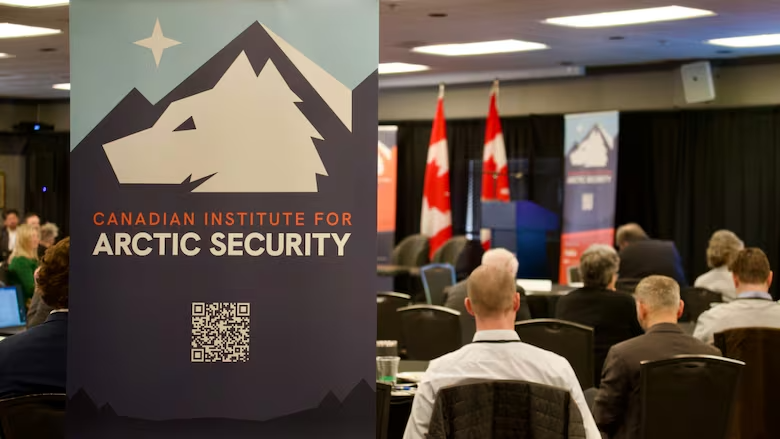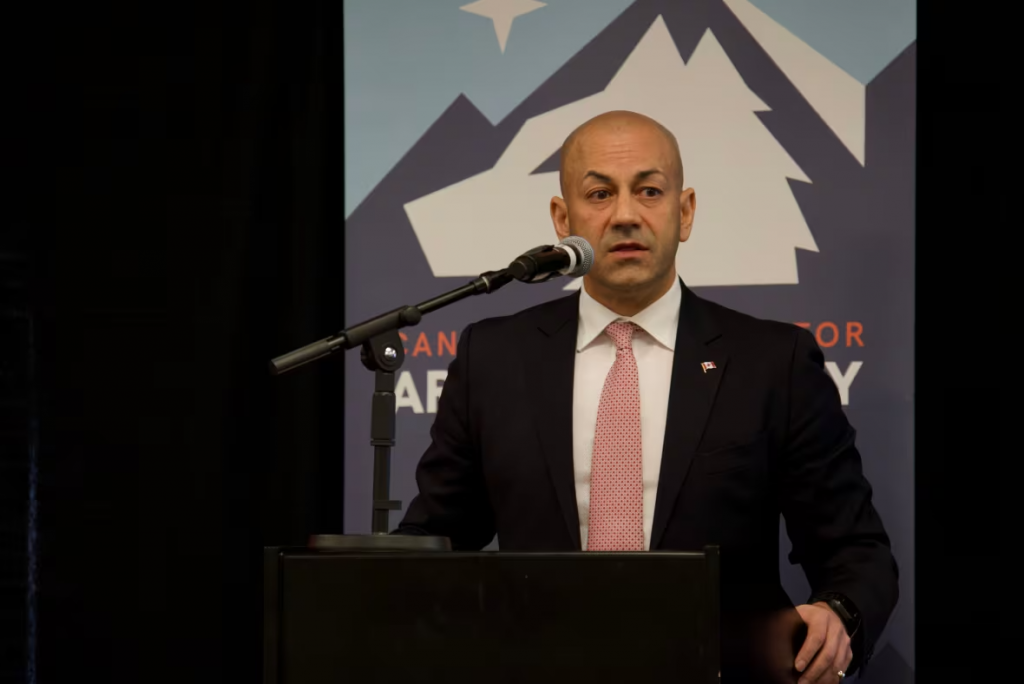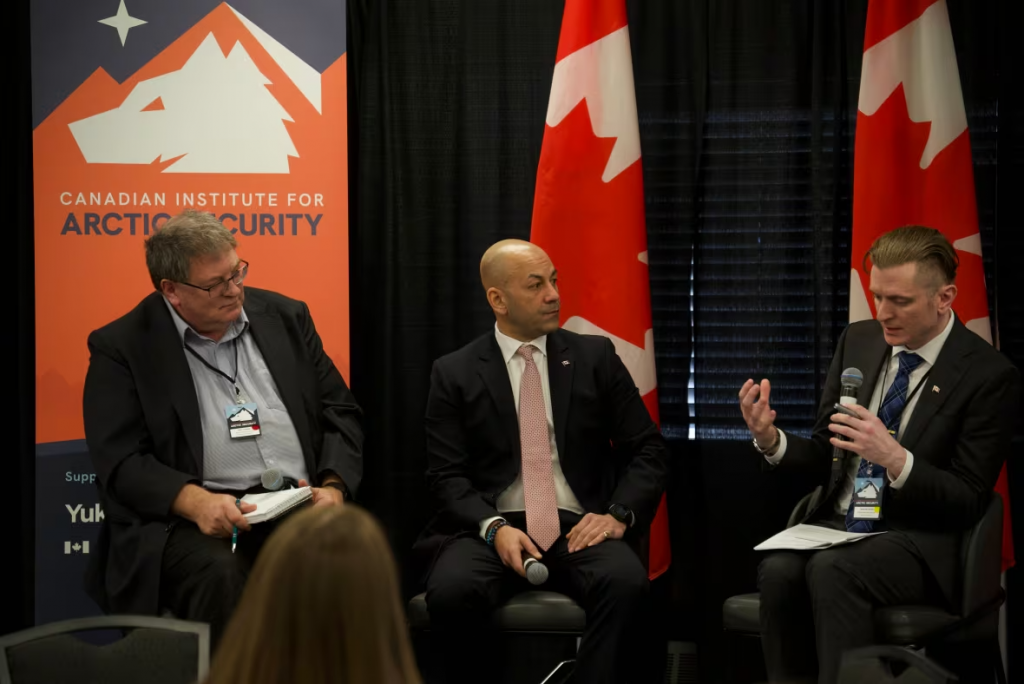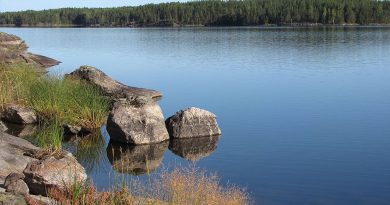New Arctic security institute encourages diplomacy with the U.S. on northern defence

U.S. Consul General wants to strengthen cross-border relationships with Canada
The public launch of the Canadian Institute for Arctic Security on Thursday provided some baseline information on northern defence — and highlighted the need for continued relations with the U.S. military amid current political tensions.
The Yukon-based institute, which received $300,000 from Ottawa last November, hosted “Conference Zero” at the Gold Rush Inn in Whitehorse. Speakers represented the Canadian Security Intelligence Service and other federal agencies, as well as the U.S. Consulate.
The institute is a Yukon government project, although its mandate is to eventually separate from government and establish itself as an independent think-tank.
It’s steered by the premier and a development board representing the federal government, Council of Yukon First Nations and Yukon University.
Premier Ranj Pillai said the institute will bring decisions about Arctic security — and related infrastructure investments — to the local level.

During his remarks to the conference, Pillai conceded that Arctic security discussions run parallel with heightening political tensions between Canada and the U.S. He recalled a “chilling” recent meeting between Canadian premiers and the U.S. deputy chief of staff in Washington, D.C.
“The first comment was, ‘Your problems will go away if you become the 51st state,'” Pillai said — arresting all hope for a congenial conversation about new trade opportunities.
Despite this, the Canadian North still has a working relationship with the U.S. on defense, Pillai said. The institute itself is modelled after the Ted Stevens Centre for Arctic Security Studies in Anchorage, Alaska.
Andrew Smith, intergovernmental relations officer with the Yukon government, is the project lead and sole coordinator for the Canadian Institute for Arctic Security. He said they have maintained a positive relationship with their counterparts in Alaska despite political tensions.
“They [at the Stevens Centre] know that having these conversations, getting people together, building leadership together, is going to benefit us on both sides,” Smith said. “Regardless of external factors — things have to outlast that.”
U.S. Consul General spoke on strengthening cross-boundary relationships
U.S. Consul General Jim Dehart, whose consular district includes B.C. and the Yukon, spoke at the conference.
Dehart declined to speak at length about the Trump administration, but offered one piece of advice: “Take [the president] at face value. Take what he says seriously, even take it literally, and go from there.”
The U.S.’s national strategy for the Arctic, which was introduced in 2022 and drafted plans for defence and environmental protections, went out with the previous administration, Dehart said. The Trump administration will eventually write its own plan.

Dehart said his office still wants to strengthen cross-border relationships, like the one between the Yukon and Alaska, and to continue to approach defence diplomatically.
“I think to be most effective, we need the utmost collaboration with Canada,” Dehart said. “Personally, I want that to be seamless. It’s pretty important.”
Dehart also criticized Canada’s spending on NATO.
“It’s trending in the right direction, but quite honestly, Canada has a ways to go,” he said.
Arctic facing ‘unprecedented number of threats’: CSIS
Nicole Giles addressed the conference on behalf of the Canadian Security Intelligence Service (CSIS).
Giles said the Arctic is facing an unprecedented number of threats.
“Quite frankly, they are beginning to overwhelm our capacities to confront alone,” Giles said.
Giles said there’s a broad range of threats, from foreign interference to violent extremism and cyber attacks. He added that those threats are targeting all levels of government, from the territorial level to First Nations governments and even school councils.
“The bottom line, from our perspective, is that national security is no longer the sole domain of the federal government,” Giles said. “Those attending this conference may be targets of national security threats, but you’re also part of the solution.”
Related stories from around the North:
Canada: A look at how the Canadian military is training for potential conflicts in the North, CBC News
Finland: Finnish Defence Minister tells party leaders shrinking fighter fleet would be “irresponsible”, Yle News
Greenland: Vance slams Denmark for not keeping Greenland safe from Russia, China, Thomson Reuters
Iceland: Iceland’s FM announces defence review, calls revamped security policy ‘urgent’, Eye on the Arctic
Norway: Norway’s Arctic ambassador speaks at Murmansk congress via video conference, The Independent Barents Observer
Russia: Russia launches new hypersonic-weapon submarine, The Independent Barents Observer
Sweden: Swedish defence spending to rise by SEK 300 billion over the next decade, Radio Sweden
United States: Trump’s Greenland rhetoric, VP Vance visit, could backfire on U.S.: expert, Eye on the Arctic



